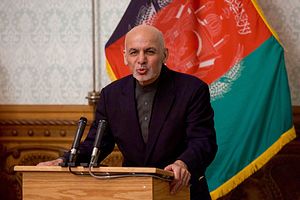Afghan President Ashraf Ghani extended an olive branch to the Taliban at the Kabul Process-II meeting on February 28, 2018 by announcing a comprehensive peace proposal to the armed opposition group. The road map unveiled by the president accepted all the demands the Taliban had put forth from time to time, barring the announcement of a time frame for foreign forces to withdraw from Afghan soil. Even this very concern, to a certain extent, has been addressed by Kabul proposing that the demand considered as part of peace negotiations. Talking to local media, the chief executive officer of the High Peace Council said that the withdrawal of the international forces from Afghanistan can be discussed as the first item on the agenda.
Following announcement of this comprehensive offer, the Afghan public has also been calling upon the Taliban to explore ending the longstanding Afghan conflict through political settlement. The Helmand sit-in was one of the many forums for people to raise their voices in support of the peace process. The sit-in, organized in the aftermath of a deadly suicide attack in Laskargah city of Helmand province, is now being replicated in many other provinces. Such unprecedented initiatives have been an additional source of pressure on the Taliban, making it difficult for them to ignore Kabul’s peace offer.
However, the Taliban have not offered a reaction, negative or positive, in the six weeks since the Kabul Process-II. The long silence has been uncharacteristic of the Taliban, who have always been very fast to refute any peace offer in the past; they have always had reasons to refuse. The delay has been a clear indication that the Taliban are faced with conundrum. The road map offered by Ghani left the Taliban with limited reasons to continue fighting and avoid peace negotiations. Yet has always been difficult for the Taliban to join a formal negotiation process, mainly because they fear that this might harm the legitimacy of the war they have been waging since collapse of their theocratic regime in 2001.
The Taliban rooted their struggle in a narrative that sees the post 9/11 Kabul regime as a puppet of the West. They call the foreign forces operating under the United Nations’ Security Council mandate invaders. This narrative, further supported by bad governance and a corrupt judicial system, has helped the Taliban mobilize not only foot soldiers but also financial resources inside Afghanistan and beyond. Agreeing to peace talks with a government that has always been tagged as a marionette will potentially cause skepticism among the rank and file. Joining the peace process could make the mid-level leadership and foot soldiers, the segment of the Taliban practically engaged on the battlefield, question the legitimacy of the anti-Kabul rhetoric.
In addition, since there are hardliners among the Taliban that only believe in military conquest, the Taliban leadership may be wary of factions forming among their ranks at the senior level. The Taliban can be classified into three main groups: the clergy, which gives religious legitimacy to the ongoing Taliban warfare; the political leadership responsible for political agenda setting; and the military, which is engaged in the actual fighting. Hence, there is concern among the Taliban leadership that should they opt to engage in dialogue to reach a political settlement, there might be breakaway factions.
There is no guarantee that the peace talks between the Kabul administration and the Taliban will make headway. Any peace negotiation is a tiresome, time-consuming process with equal possibilities of failure and success. Hence, the Taliban are not prepared to risk their well-established structure, strong narrative, and network of formal and informal relations with people and entities for a peace overture that might fail. However, denying the comprehensive peace proposal presented by Ghani and mounting public pressure has presented the Taliban with a dilemma.
In light of the challenges that Taliban are faced with, expecting the militant group to provide a formal response to the Kabul Process-II package would be naïve. In a context where the Taliban are not able to make decisions, the Ghani administration should take one step further by finding avenues to open behind the scene channels for peace negotiations as part of track 1.5 and track 2 diplomacy. In the past, Kabul has shown little interest in informal talks, believing that they would distract attention from formal negotiations. However, given the circumstances and concessions offered as part of the overture in Kabul Process-II, this additional brave step could be decisive in the quest for peace in Afghanistan.
The opportunity to engage in the peace process without a public announcement will provide the Taliban a chance to test the waters vis-a-vis negotiations and the potential for success. During the process, the two sides can agree on a distinct set confidence building measures as well. As the negotiations mature, parties to the negotiation can gradually make their progress public and engage additional stakeholders as required for the success of the process. Now that Ghani has offered a very generous package meeting almost all demands of the opposition groups, one additional step could lead to a long-awaited peace talks.
Mushtaq Rahim (@mushtaq_rahim) is an independent political and security analyst, and expert on conflict management and peacebuilding.

































